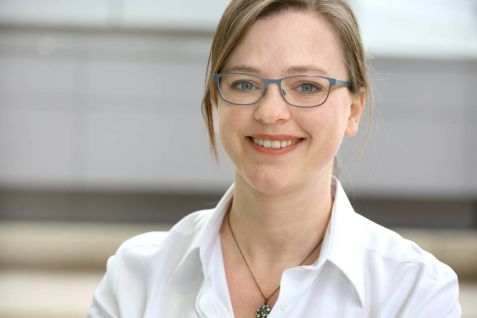Dr Sabrina Disch awarded the Wolfram-Prandl-Prize

Dr Sabrina Disch. Copyright: Ellen Bornkessel
ILL warmly congratulates Dr. Sabrina Disch, the winner of the Wolfram-Prandl-Prize 2020 for young scientists. The German Committee Research with Neutrons (KFN) awarded the prize on the occasion of the German Conference Neutron Scattering Conference (DN2020) .
Dr. Sabrina Disch received the 2500-Euro prize „for her outstanding research results on the understanding of structure, spin structure and spin dynamics of magnetic nanoparticles, their self-organisation and the resulting forming structures, achieved with innovative neutron scattering methods“, said KFN chair, Dr. Astrid Schneidewind in her statement.
Dr Sabrina Disch did a post-doc at ILL under the supervision of Albrecht Wiedenmann, and is still a core user of the ILL. The neutron experiments she led at ILL were key to the success highlighted by the Wolfram Prandl Prize.
The Wolfram-Prandl-Prize 2020 honours her research results on magnetic nanoparticles. This field is highly topical: on the one hand, it addresses fundamental challenges in the synthesis and understanding of the magnetism on the nanometer scale; on the other hand, magnetic nanoparticles have a high potential for application, for example in magnetic sensor technology, in catalysis or in medical diagnostics and therapy. Due to an extremely successfully combination of preparative work, macroscopic characterisation, X-ray and neutron scattering, it has achieved impressive breakthroughs in the understanding of structure, spin structure and spin dynamics of magnetic nanoparticles, their self-organisation and the structures that form in the process on all characteristic length scales – from atomic via nanoscopic to mesoscopic. The work is exemplary for the complementary application of synchrotron X-ray scattering and neutron methods, for the most demanding method development in research with neutrons as well as for interdisciplinary work at the border between chemistry, physics, crystallography and material sciences.
For her results Sabrina Disch had to develop highly innovative methods, such as small and wide angle scattering on nanomaterials with polarisation analysis, scattering with a time resolution in the sub-millisecond range, or the development of in-situ magneto-rheological small angle scattering.
Many thanks to Dr. Karin Griewatsch / KFN
